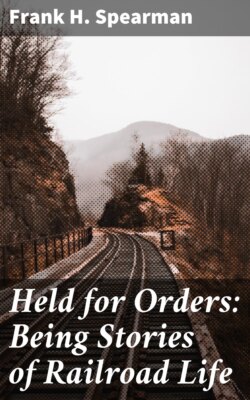Читать книгу Held for Orders: Being Stories of Railroad Life - Frank H. Spearman - Страница 9
На сайте Литреса книга снята с продажи.
HOW McGRATH GOT AN ENGINE
ОглавлениеTable of Contents
This came about through there being whiskers on the rails. It may not be generally understood that whiskers grow on steel rails; curious as it seems, they do. Moreover, on steel rails they are dangerous, and, at times, exceedingly dangerous.
Do not infer that all steel rails grow whiskers; nor is it, as one might suppose, only the old rails that sport them. The youngest rail on the curve may boast as stout a beard as the oldest rail on the tangent, and one just as gray. They flourish, too, in spite of orders; for while whiskers are permitted on engineers and tolerated on conductors, they are never encouraged on rails. Nature, however, provides the whiskers, regardless of discipline, and, what is more, shaves them herself.
Their culture depends on conditions. Some months grow better whiskers than others: September is famous for whiskers, while July grows very few. Whiskers will grow on steel rails in the air of a single night; but not every night air will produce whiskers. It takes a high, frosty air, one that stays out late, to make whiskers. Take, for example, the night air of the Black Hills; it is known everywhere among steel rails as a beard tonic. The day's moisture, falling as the sun drops beyond the hills is drawn into feathery, jewelled crystals of frost on the chilly steel, as a glass of ice-water beads in summer shade; and these dewy stalagmites rise in a dainty profusion, until when day peeps into the cañons the track looks like a pair of long white streamers winding up and down the levels. But beware that track. It is a very dangerous track, and its possibilities lie where Samson's lay—in the whiskers.
So it lies in early morning, as pretty a death-trap as any flower that ever lured a fly; only, this pitfall waits for engines and trains and men—and sometimes gets them.
It waits there on the mountain grades, in an ambush really deadly for an unwary train, until the sun, which is particularly lazy in the fall, peeping over into the cuts, smiles, at length, on the bearded steel as if it were too funny, and the whiskers vanish into thin air.
A smooth-faced rail presents no especial dangers; and if trainmen in the Hills had their way, they would never turn a wheel until the sun had done barbering. But despatchers not having to do with them take no account of whiskers. They make only the schedules, and the whiskers make the trouble. To lessen their dangers, engineers always start, up hill or down, with a tankful of sand, and they sand the whiskers. It is rough barbering, but it helps the driver-tires grit a bit into the face of the rail, and in that way hang on. In this emergency a tankful of sand is better than all the air Westinghouse ever stored.
Aloysius McGrath was a little sweeper; but he was an aspiring one, for even a sweeper may aspire, and in point of fact most of them do aspire. Aloysius worked in the roundhouse at the head of the Wind River pass on the West End Mountains. It is an amazingly rough country; and as for grades, it takes your breath merely to look down the levels. Three per cent, four per cent, five per cent—it is really frightful! But Aloysius was used to heavy falls; he had begun working for the company as a sweeper under Johnnie Horigan, and no engineer would have thought of running a grade to compare with Johnnie's headers.
Horigan was the first boss Aloysius ever had. Now Aloysius, if caught just right, is a very pretty name, but Johnnie Horigan could make nothing whatever of it, so he called Aloysius, Cooney, as he said, for short—Cooney McGrath—and, by the way, if you will call that McGraw, we shall be started right. As for Horigan, he may be called anything; at least it is certain that on the West End he has been called everything.
Johnnie was ordinarily boss sweeper. He had suffered numerous promotions—several times to wiper, and once to hostler; but his tendency to celebrate these occasions usually cost him his job, and he reverted to sweeping. If he had not been such an inoffensive, sawed-off little old nubbin he wouldn't have been tolerated on the pay rolls; but he had been with the company so long and discharged so often that foremen grew tired of trying to get rid of him, and in spite of his very regular habits, he was hanging on somewhere all the time.
